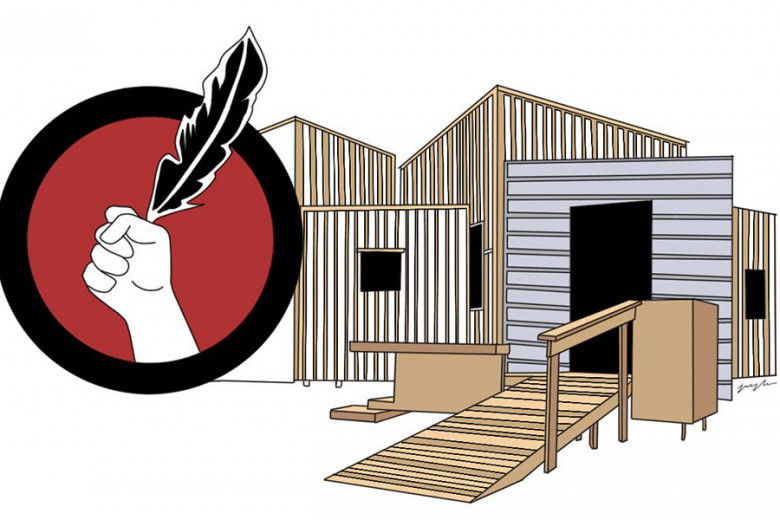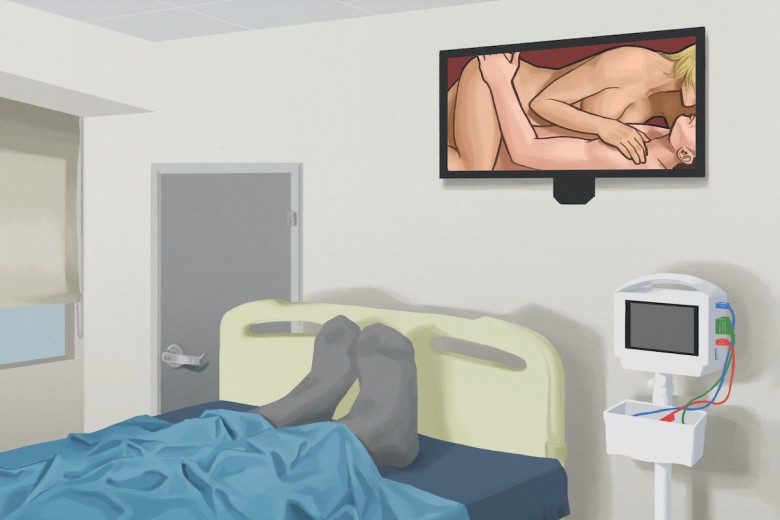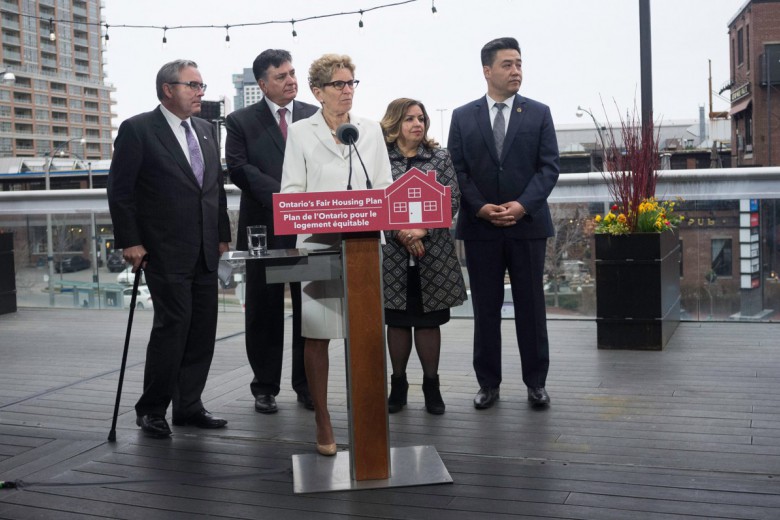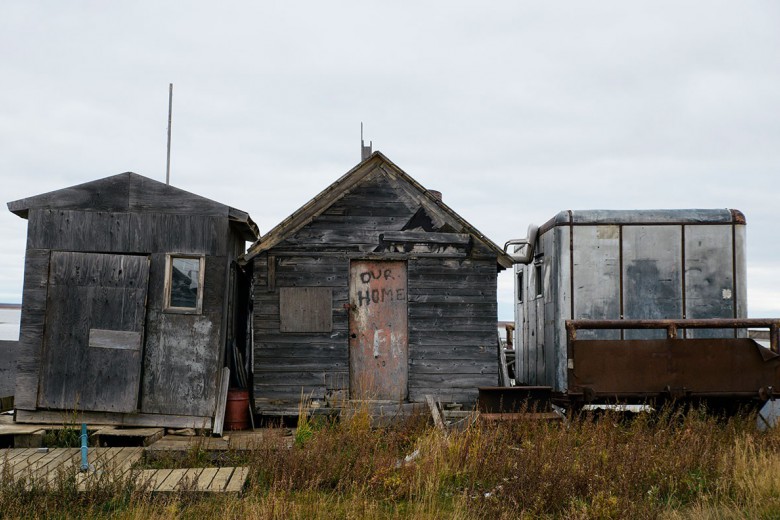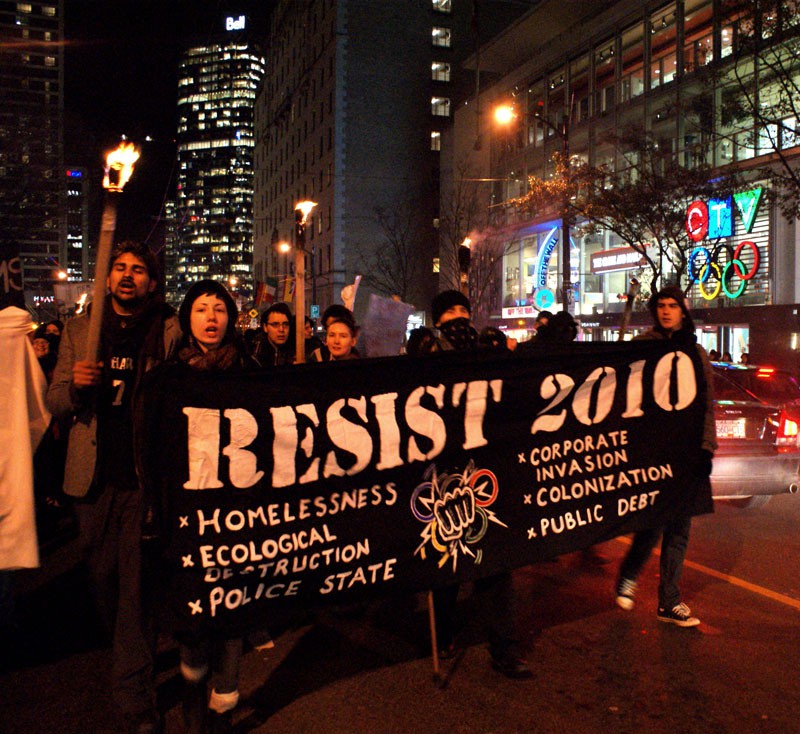
On February 12, 2009, exactly one year before the opening of the 2010 Winter Olympics in Vancouver and Whistler, the grim future of political freedom in British Columbia was on full display. Military and police flanked by helicopters rehearsed manoeuvres in Vancouver, where escalating harassment, intimidation and surveillance of activists had already begun. Those celebrating the event put aside concerns about the costly preparations for the Games. As the orchestrated magic took hold in Whistler Village, celebrants and athletes were swept up in the moment. They, like most of the mainstream media and all levels of government, were simply not going to think about the elephant on the slopes: security. Security has emerged as one of the largest single costs associated with the 2010 Olympics, and will carry significant costs for civil liberties as well.
To Olympic supporters it may seem churlish, even unpatriotic, to speak of this billion-dollar elephant, question how it got there or ask how we can remove it before it trashes the place. Olympic boosterism has worked to exclude critical voices and suppress important public policy questions. For critics of the Games, the security apparatus currently being assembled is a major concern.
A redecorated billboard at Canada Place, Vancouver, November 2008.
Challenging the Olympic mythology
Concerns about the Olympic Games extend beyond the billion dollars taxpayers will pay to provide security for the 17-day event or the lasting damage to civil liberties for people in Canada. The 2010 Olympic events are using the resources of Indigenous land which has never been legally ceded to the Canadian government, while neglecting the outstanding issues of Native communities. The environmental impacts of clear-cuts, destruction of bluffs and mountain ecosystems, road construction, gravel mining, massive consumption of resources, threats to fish and animal populations and accelerated approval processes for mining, logging, oil, gas and tourist infrastructure belie claims that these will be “the Green Games.” Growing numbers of people oppose the host of issues that accompany the modern Olympic Games: the commercialization of sport, lack of transparency in government, backroom deals for real estate and development interests, exploitative labour standards for migrant workers, promotion of corporate sponsors with appalling human rights and ecological records (including Nike, Shell, Royal Bank, Petro-Canada, Dow Chemical, Teck Cominco, General Electric, General Motors and Coca-Cola), and appropriation of public space.
Massive public debt (often billions of dollars) plagues host cities: Montreal has only recently paid off its 1976 Games and Vancouver’s share of the $6 billion cost of the 2010 Games continues to grow. As B.C. faces a poverty and housing crisis, efforts to forcibly remove visible homelessness from Vancouver and broken promises of social housing clash with the Olympic claims of social sustainability. Since the 1980s, the Games and related development have displaced over 3.5 million people worldwide.
The issues which unite Olympic critics are those which most threaten the carefully crafted Olympic image. Many groups are critical of the Games, some regarding specific aspects and others opposed to the entire scheme of the Olympics. Community groups in the Downtown Eastside, anti-poverty and Indigenous activists, environmentalists and civil libertarians have been exposing the negative impacts of hosting the Games to a local and international audience. One group that has united some of these elements is the Olympic Resistance Network, whose organizing slogan “No Olympics on Stolen Native Land” accents the fact that the Olympics will occur on unceded territories. That group and others are responding to a call to boycott and oppose the Games from the 2007 Indigenous Peoples Gathering in Sonora, Mexico. The Olympic Resistance Network holds public education forums, rallies and marches and has called for a public convergence to protest and disrupt the Games in 2010.
The high price of policing dissent
Vancouver’s bid book, submitted in 2002, projected a cost of $175 million for providing security for the proposed Vancouver/Whistler Olympic Games – a substantial sum, but still small by the standards of recent Games and other major events. The Group of Eight meeting held in Kananaskis, Alberta, in 2002 had a security tab of over $300 million for a three-day event that was vastly simpler in scope and geography. The Bid Corporation and the successor organization, the Vancouver Organizing Committee for the Olympic Games (VANOC), have stuck with the projected number, both claiming that security “experts,” including the RCMP, had approved the $175 million estimate.
RCMP documents obtained through access to information refute this claim. A 2005 letter by the head of the Vancouver 2010 Integrated Security Unit (VISU) called the VANOC security budget “conceptual.” RCMP briefing notes from 2003 noted that the Mounties had never been consulted prior to the bid book numbers. Other RCMP documents showed that the force was more interested in managing public perceptions about Olympic security costs than in informing the public that they had been deliberately misled.
During this period, the true costs for security from other Olympic cities were revealed: $1.3 billion in Salt Lake City, 2002; $1.7 billion in Athens, 2004; $1.4 billion in Torino, 2006; and a projected $3 billion in London, 2012.
Finally, in October 2008, then-Public Safety Minister Stockwell Day stated that security costs would be vastly higher than the $175 million projection – the new estimate ranging from $400 million to $1 billion. Over time the numbers drifted toward the high-end estimate. Security agencies led by VISU continued to refuse to clarify the final numbers. Briarpatch has learned from one journalist with VISU contacts that the agency had no real idea of the cost: “They simply don’t know what it will all cost by 2010. There appears to be no bottom line.”
By the end of February 2009, it was finally acknowledged that the security bill would be over a billion dollars and could go even higher if potential threats emerged. These figures are only those projected for the provincial and federal governments, and don’t include the substantial costs to the City of Vancouver itself, including the Vancouver Police Department.
The publicized numbers for security forces for the B.C. Games are similarly underplayed. The Sydney Olympics in 2000 featured 35,000 police and other security personnel (four security personnel for each athlete), including 4,000 troops. The 2004 Olympics in Athens deployed 70,000 police and troops in addition to NATO’s Mediterranean naval fleet. For 2010, the estimates of the various security forces amount to 13,000 police officers and troops, plus 4,000 private security guards and U.S. military participation. In an era in which extraordinary security operations have become the norm, the official numbers for 2010 are incongruously low compared to recent Olympics and can be expected to go much higher.
Identifying the true “threat”: embarrassment
Much of the security planning appears driven by threat assessments conducted by the Integrated Threat Assessment Centre, a branch of the Canadian Security Intelligence Service. The Integrated Threat Assessment Centre initially evaluated three main concerns for 2010 security. In order of severity, these were: foreign-based terrorism, crime and domestic protests. By the end of 2008, a document released through access to information had narrowed the scope. The concerns now were foreign terrorism, listed as a “low” level threat, and anti-Olympic demonstrations, now considered a primary threat, with a listing of “medium.” How demonstrations constituted a security threat or why they were considered more threatening than foreign terrorism was not made clear, though the Canadian government has historically placed Indigenous, environmental and antiglobalization protesters high on its lists of internal security concerns, and those groups figure prominently in the communities planning to protest the Games.
Whatever threat of disruption the protests may constitute, soldiers and F18s are not the proper response to demonstrations, at least not in a functional democracy. All levels of government are spending an inordinate amount on military-style security, and the only likely targets are protesters and those whose glaring poverty threatens Vancouver’s public image. Primarily, the rationale seems to be framed by a fear of embarrassment, rather than any realistic concerns about physical security for athletes or the general public.
Morning wake-up call courtesy of Vancouver’s police department, July 2008. “Watch for the Vancouver Police Department’s continued use of bylaw enforcement for minor acts like jaywalking, littering or sleeping in streets or parks against the homeless in an effort to get “˜no-go’ orders banning them from particular areas of the city” warns David Eby of the B.C. Civil Liberties Association.
Secrecy and social cleansing
These concerns about the exposure of embarrassing realities during the 2010 Games underlie attempts to remove the homeless and petty criminals from Vancouver. Such efforts have been stepped up, with the movement of so-called undesirables from B.C. to other provinces to face minor charges, previously considered not worth the cost of relocation. An RCMP officer in charge of the Vernon, B.C., detachment predicted “quite an aggressive displacement” of criminals and the homeless by Vancouver police, and warned that other municipalities will face increased social problems due to such tactics.
Those Vancouverites who are not targeted for removal will still have to contend with police searches, video surveillance and major restrictions on their movement and access to homes, workplaces and community services. Extensive areas surrounding major hotels, sporting venues and event locations throughout Vancouver and Whistler will have public video monitoring and police checkpoints requiring credentials and searches. There will be no-fly zones over downtown and most boat traffic will be barred from False Creek.
It is apparent who will bear the brunt of the anticipated crackdown. According to Harsha Walia, a Vancouver organizer with No One Is Illegal and the Olympic Resistance Network, these “Orwellian measures are not just an invasion of privacy for all residents of Canada. They will be disproportionately utilized in and beyond 2010 against Indigenous people, poor people, people of colour and other communities who are repressed and marginalized not only for what they say or do, but simply for who they are.”
Most of the preparations for 2010 policing and social cleansing have occurred in secret. VISU claims that this is for “operational security,” but this secrecy extends beyond deployment specifics and encompasses potential civil liberties restrictions, limits on the freedom of movement and plans for spending the $1 billion security budget. VANOC itself is not subject to freedom of information and access to information regulations, and has not been forthcoming with details in response to public requests for information.
Despite such secrecy, security operations at previous Olympics give an indication of how such massive budgets and intense security infrastructure may be used. Traditionally, host cities work to socially cleanse their communities of visible poverty as well as dissent. Former Olympic host cities including Athens, Atlanta and Los Angeles also relocated or isolated members of poor and minority communities, as Vancouver did during Expo 86. At a February 26 forum hosted by advocacy group Pivot Legal Society (the first at which VISU members were available for public questions), senior police officials stated that no such clearances were planned. In response to audience questions, however, it was acknowledged that homeless people living within security perimeters for Olympic events would be relocated.
Social cleansing can be achieved by many methods. David Eby of the B.C. Civil Liberties Association and Pivot Legal Society says to “watch for the Vancouver Police Department’s continued use of bylaw enforcement for minor acts like jaywalking, littering or sleeping in streets or parks against the homeless in an effort to get “˜no-go’ orders banning them from particular areas of the city and increased use of private security guards in public space to move the homeless along.” According to Laura Track of Pivot Legal Society, “People are afraid – I think rightly given the experience in Atlanta – that these tickets will be used as grounds to arrest and imprison people during the Olympics who have been unable to pay the fines.” Eby further warns that the B.C. Housing Minister has proposed allowing police to force the homeless into emergency shelters in inclement weather (such as during the Winter Games). VANOC has budgeted for a temporary shelter open only for the duration of the Olympics, instead of a long-term investment.
A history of home-grown political suppression
Antiglobalization protesters have been a major focus of Canadian security operations and subjected to police abuses and violence in contexts similar to the Olympics. Canadian trade meetings have featured monitoring, intimidation and infiltration of political opponents by security forces. The 2007 meeting of the Security and Prosperity Partnership in Montebello, Quebec, for instance, saw the on-video exposure of police provocateurs trying to incite violence within demonstrations.
Other events, such as the 2001 Summit of the Americas in Quebec City, the 2001 Pacific Northwest Economic Region meeting in Whistler and the 2002 Group of Eight meetings in Kananaskis have shown the extent of police interference and violence with groups exercising free expression. The Group of Eight meeting in Kananaskis included the instruction that police and military could “shoot to kill” demonstrators who entered the secured zone, even for peaceful civil disobedience. Indigenous activists, already heavily targeted by VISU, have long faced a greater level of police and military abuses, with violence and death occurring during police sieges against Natives in traditional territories. In separate Indigenous land reclamations in 1995, thousands of rounds of ammunition were fired against activists at Gustafsen Lake, B.C. (injuring one), and in Ipperwash, Ontario, Dudley George was killed by the Ontario Provincial Police.
A notable local example of restrictions on civil liberties occurred in November 1997, when the University of British Columbia (UBC) campus, adjoining Vancouver, hosted the leaders’ summit of the Asia-Pacific Economic Cooperation (APEC) forum. The excessive use of physical force, pepper spray and police interference against non-violent demonstrators surprised many, but such tactics continue to be utilized by Canadian police. Later legal proceedings revealed an extensive surveillance effort against even mainstream peace and environmental organizations and small non-threatening groups like the Raging Grannies – older women who wear funny hats and shawls to sing protest songs. Photos and descriptions of potential anti-APEC activists were distributed to police for monitoring and eventual pre-emptive arrests of some organizers.
The office of then-Prime Minister Jean Chrétien promised authoritarian leaders such as Indonesia’s General Suharto that they could attend APEC without fear of “embarrassment.” To keep this promise, UBC’s administration imposed a blanket restriction on any political signs or demonstrations along motorcade routes or anywhere remotely near the leaders’ meeting place. The Prime Minister’s Office specifically requested that protests be isolated to fenced-off areas of campus where they could not be witnessed by world leaders. Not only were signs seized from individuals, residences and offices (even those far from the meeting place), but people were arrested for holding signs (one reading simply, “Democracy, Human Rights, Free Speech”) that might have been read by a dictator in a passing limousine.
The involvement of politicians in planning security and restrictions on protest was revealed but never fully explored, since the RCMP’s Public Complaints Commission focused on bland recommendations and minor reprimands. However, even the flawed report declared that the right to protest must mean the “right to be seen and heard.” Nevertheless, the next time Prime Minister Chrétien returned to Vancouver in 1998, dozens of non-violent protesters were attacked by police, whose weapons escalated from pepper spray to batons. Many fear a further escalation in police violence at demonstrations against the 2010 Olympics.
Policing and the “right to be seen and heard”
The recommendations that came out of the APEC hearing have seemingly been ignored by those planning security for the 2010 Games. Promises to APEC leaders by Canadian officials that there would be controls on signs and public assembly are similar to those given to the International Olympic Committee by the City of Vancouver. UBC has agreed to restrictions on non-Games signs during Olympic events, but the details of this agreement are being kept from students and student government. Garth Mullins, a local organizer involved in the APEC protests and hearings and a member of the Olympic Resistance Network, notes, “The RCMP has learned little since APEC and the inquiry. Led by the Mounties, VISU seems to be going down that same tired road of intimidating activists, infiltrating and spying on social movements and criminalizing dissent.”
Protest pens (fenced-in areas for demonstrators that are isolated from the public) and control of political displays are already planned for the Games under the guise of “free speech zones.” Once again, Canadian Charter rights to free expression seem to be limited; if a protest pen is a “free speech zone,” then what is the rest of Canada? “The worst thing that could occur is a repetition of all the mistakes from APEC,” suggests Eby. “The key difference between then and the potential errors now is that the rights violations at APEC were focused in just one part of Vancouver, UBC, where here Olympic events will be taking place across the city, and for over two full weeks.”
The City of Vancouver has already approved expanded bylaw powers to control “illegal” signs (those not authorized by the Olympics), leafleting, public performances (such as street theatre) and access to public areas near Olympic venues. Council’s bylaw changes may allow police and city officials to enter private homes, businesses and cars to remove unapproved advertising and anti-Olympic signs with “limited notice” and levy $10,000-a-day fines. The host city commitments include removing signs that are not part of the Olympics or those of Olympics’ sponsor corporations.
Within the same council motions that curtail public freedoms, VANOC and Olympic sponsors were being liberated from current city bylaws. Vancouver plans to relax building, zoning, noise and sign regulations to facilitate Olympic events and promotions, while restricting those that apply to non-Games activities or messages. Although city council claims that its concern is to reduce “ambush marketing,” it has refused to clarify these powers or specify their use in the context of freedom of expression rights. Meanwhile, every inch of outdoor advertising has already been bought by the Games and their sponsors for the duration of the Olympics.
In January 2009, city council met to vote on several Games-related motions, including the political controls outlined above. After many people spoke out against increased Olympic funding and new bylaw powers which would reduce public displays of speech, expression and assembly, council approved the motions without alteration. A recommendation for a sunset clause failed, as did a proposed amendment which stated that these powers were not to be used to restrict Charter rights.
Meanwhile, intelligence gathering, intimidation of organizers and attempts to recruit informants is intensifying throughout the Lower Mainland, Vancouver Island and in First Nations communities. Dozens of activists have already been questioned or approached for information, including people who had spoken out to council against the bylaw changes who were approached by police on the steps of City Hall. VISU officers regularly enter reserves to conduct “home visits” and attend community meetings unrelated to the Olympics.
As activists were preparing for an Olympic Resistance Network march on the day of the one-year countdown to the Games, a vehicle with several march participants was stopped by police for a “random ID check,” demanding ID from all the vehicle’s occupants. Although by law passengers of a vehicle do not have to identify themselves to police, the Vancouver Police Department detained the group for 40 minutes and intimidated them into complying. The office that they had left, that of the Anti-Poverty Committee, also involved in anti-Olympic organizing, had had its front door dusted for fingerprints by the Vancouver Police Department just a day before.
It would seem that Olympic opponents and Indigenous activists are being monitored in the same way as anti-APEC protesters were, with the potential for police abuses, surveillance, harassment and pre-emptive arrests.
In response to these tactics, activist groups and the B.C. Civil Liberties Association have urged VISU to stop harassing anti-Olympic activists. The Olympic Resistance Network has announced that their group will not meet privately with security forces, as VISU’s object appears to be to intimidate activists and restrict freedoms of assembly, mobility and expression. Even city council has urged VANOC to hold open community consultations (though it is unlikely they would be effectual in altering proposed security) before security plans are finalized, as VANOC had originally pledged to do.
VISU has told the media that they are “consulting” with activists and civil liberties advocates, but members of the B.C. Civil Liberties Association who attempted to discuss the political implications of security planning with VISU “ran into a brick wall,” says Eby.
Olympic Resistance Network protesters march past the offices of CTV in downtown Vancouver, February 12, 2009.
The 2010 legacy
The military and police rehearsals of Exercise Silver, which took place in Vancouver in February, included 1,000 members of the police and military as well as surveillance aircraft and armoured personnel carriers. An expanded operation, Exercise Gold, planned for the fall of 2009, will see the security forces attempt to impress upon Vancouver their complete control of the city and its population before the Games even arrive.
“I believe the 2010 Games will be our winter of discontent,” says Mullins. “Given what we have seen in the past and in the lead-up to the Games, expect a rather draconian crackdown on dissent. We will see the same intimidation, pre-emptive arrests, disinformation and agents provocateurs, but this time there is a $1 billion security budget, military deployments and a multi-agency police body with a large staff dedicated to controlling political expression. Also, the mainstream media is even more accommodating than usual, since many are actual sponsors of the 2010 Games, with a financial stake in how the Games are perceived.
“If it takes a police state to hold the Olympics, it’s just not worth doing in the first place.”
Laura Track from Pivot Legal adds, “Protest groups will use the forum of the Games to raise issues around poverty, aboriginal rights, homelessness and other concerns. Without consultation beforehand it is far more likely that there will be repression, arrests and, potentially, violence.”
Activists and residents are concerned that the planned security measures and restrictions of political freedoms for Olympic events will be permanent and used as a blueprint for other cities to copy. Expanded bylaw powers approved by the City of Vancouver are described in that motion as a “template for future special events.” The increased ability to limit free speech, expression and assembly will already be in place the next time the city sees fit to do so.
“We have every reason to worry that much of the security infrastructure will remain behind because that is the typical Olympic legacy if you look at other host cities,” says Eby. “The B.C. Information and Privacy Commissioner has warned that there will be no free passes for government to keep the surveillance cameras up after the Games, but every indication is that deals are being cut right now to ensure that the cameras are being left behind.” In Sydney, Athens and other host cities, public space restrictions and closed-circuit television cameras that were installed for the Olympics remained long after the Games were over. On March 26, Vancouver approved funding for CCTV during the Games; although it was described as temporary, it included no requirements that the technology ever be removed. By April 3, additional CCTV had been approved on an ongoing basis for Vancouver and other B.C. cities.
On the day of the one-year countdown to the Games, International Olympic Committee President Jacques Rogge spoke in Whistler. “Security investments always leave a good legacy on security for the country,” Rogge said. “Whenever the Games are finished, everything that has been built, the expertise that has been acquired, the hardware that has been put in place, is serving the country and the regions for decades to follow.”
Such a massive and costly security apparatus does indeed leave a legacy, since Olympics security expansions typically remain after the Games are over, facilitating increased surveillance and expanded powers to suppress political freedoms. As Harsha Walia points out, “This fortification of the security apparatus serves two primary purposes that have little to do with the propaganda of “˜our safety.’ The first is to normalize a state of fear that can readily be manipulated by the state and corporate security firms. The second is to legitimize the criminalization of resistance.” Considering that Canada plans to host another Group of Eight meeting as well as discussions on the Security and Prosperity Partnership in 2010, the Olympic-style policing of expression and control of public space may become the rule rather than the exception.
Professor Helen Lenskyj has documented the social impacts of modern Olympic Games, particularly on civil liberties. In “The Olympic Industry and Civil Liberties: The Threat to Free Speech and Freedom of Assembly” she writes, “The analysis reveals patterns of Olympic industry threats to civil liberties – most notably, to a free press and freedom of assembly – in recent bid and host cities in Europe, Canada, the United States and Australia. It is particularly alarming to note that the everyday practices of Olympic industry officials – their cynical “˜management’ of Olympic news, their co-optation of elected representatives, the sense of entitlement with which they conduct their business, and the “˜legacies’ of harsh law-and-order legislation – prompt relatively little concern or outrage.”
A police state seldom starts with tanks in the streets. It can begin with television cameras on every corner or intimidation and abuse of the poor, people of colour and political activists. Military-style policing, security infrastructure buildups and suppression of dissent are common features of modern Olympic Games, and not just in places like Beijing. As B.C. prepares for the flag-waving spectacle of the 2010 Games, the elephant on the slopes – the massive security apparatus and its political and economic costs – is settling in as a permanent resident.


